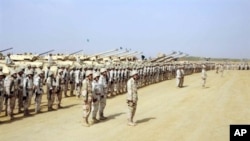The United States Thursday announced a major aircraft sale to Saudi Arabia amid tensions in the Gulf over Iran’s threat to close the Strait of Hormuz if nuclear sanctions against it are tightened. The State Department said the threat reflects recent “irrational” behavior by the Tehran government.
The nearly $30 billion sale to Saudi Arabia of advanced-model U.S. F-15 fighter jets and associated weapons systems had been planned for more than a year.
But the elaborate formal announcement of the sale was a pointed reminder of U.S. support for a key regional ally, just as Iran is stirring tensions in the Gulf with its threat against the critical shipping route.
Iran threatened earlier this week to close the strait of Hormuz if U.S.-engineered international nuclear sanctions sought to target its central bank and cripple its oil exports.
A spokeswoman for the U.S. Navy’s Fifth Fleet based in the Gulf said Wednesday the United States is always ready to counter hostile actions to assure freedom of navigation, and a Navy aircraft carrier passed through
the strait as Iran conducted naval exercises.
At a news briefing, Assistant Secretary of State for Political-Military Affairs Andrew Shapiro said the F-15 deal is designed to help Saudi Arabia “address threats to its sovereignty,” from Iran and elsewhere. “As you know the Middle East right now, there are a number of threats. They (Saudi Arabia) have had border security issues, they’ve had threats in the Gulf as well. Clearly one of the threats that they face, as well as other countries in the region, is Iran. But this is not solely directed towards Iran. This is directed towards meeting our partner Saudi Arabia’s defense needs," he said.
Under the arms package, Saudi Arabia will acquire 84 top-of-the-line F-15 model SA aircraft while 70 F-15’s already in the Saudi inventory will be upgraded to a similar capability.
Associated weapons systems in the package include Harpoon anti-ship and Harm anti-radar missiles that could conceivably figure in a military crisis that threatened Gulf navigation.
Despite the blunt U.S. Navy warning, Iran has repeated its threat about the strait, saying it was capable of closing the waterway quickly and that the United States “is not in a position” to thwart Iranian actions.
Under questioning Thursday, State Department Spokeswoman Victoria Nuland said the Iranian statements may mean that sanctions, aimed at getting Iran to meet international nuclear obligations, are beginning to have a serious impact.
"I can’t get inside Iranian heads. I wouldn’t want to even if it were appropriate from this podium. But you know, we’ve seen quite a bit of irrational behavior from Iran recently. One can only guess that the international sanctions are beginning to pinch, and that the ratcheting up of pressure, particularly on their oil sector is pinching in a way that is causing them to lash out," he said.
The Obama administration first notified Congress of the pending F-15 sale to Saudi Arabia in November of 2010 and there was no legislative move to block it.
The State Department’s Andrew Shapiro said under an act of Congress, all U.S. arms sales in the Middle East must be evaluated as to their impact on Israel’s security. He said U.S. officials are satisfied the aircraft sale is not detrimental to Israel’s “qualitative military edge.”
The White House said in a statement the arms sale, to be implemented over the next decade, will support more than 50,000 U.S. jobs in 44 states.
US Announces Saudi Arms Deal Amid Gulf Tensions




